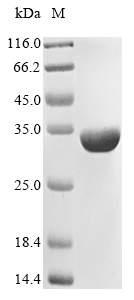Recombinant Nostoc sp. All1616 protein is produced in E. coli with an N-terminal 6xHis-tag for easy purification and detection. The protein consists of the full-length sequence from amino acids 1 to 227. Its purity exceeds 85%, as confirmed by SDS-PAGE analysis, ensuring reliable performance in research applications. The product is provided with a low endotoxin level, making it suitable for various in vitro studies.
The All1616 protein from Nostoc sp. appears to play a role in the metabolic pathways of cyanobacteria, which may be crucial for understanding photosynthetic processes. As a component of these pathways, it could be integral to studies focusing on the biochemical and physiological functions of cyanobacteria. This might offer insights into broader biological processes related to energy conversion and environmental adaptation.
Potential Applications
Note: The applications listed below are based on what we know about this protein's biological functions, published research, and experience from experts in the field. However, we haven't fully tested all of these applications ourselves yet. We'd recommend running some preliminary tests first to make sure they work for your specific research goals.
1. Protein-Protein Interaction Studies Using His-Tag Pull-Down Assays
This application is reasonably suitable. As a prokaryotic protein expressed in a compatible system (E. coli), all1616 has a good probability of being correctly folded. The His-tag allows for effective pull-down assays to identify interaction partners from Nostoc lysates. However, validation with positive controls is still recommended to confirm specific interactions.
2. Antibody Development and Validation
This recombinant all1616 is excellent for generating specific antibodies. The full-length protein provides comprehensive epitope coverage, and the high purity ensures minimal cross-reactivity. Antibodies can be used for detecting all1616 in cyanobacterial samples.
3. Biochemical Characterization and Stability Studies
This is a priority application to confirm protein quality. Techniques like SEC and CD spectroscopy can assess oligomeric state and folding. These studies provide essential data for understanding the protein's biophysical properties. Initial characterization ensures the protein is properly folded and stable before functional studies.
4. Comparative Proteomics and Cross-Species Analysis
This protein is ideal as a reference standard for comparative studies across cyanobacterial species. Its prokaryotic origin ensures relevance for cross-species analyses within bacterial systems.
Final Recommendation & Action Plan
This recombinant all1616, being a prokaryotic protein expressed in a compatible E. coli system, is highly suitable for most applications, with a good probability of correct folding. Start with Application 3 (Biochemical Characterization) to confirm folding and stability. Once validated, proceed with Applications 1, 2, and 4 for interaction studies, antibody development, and comparative analyses. The compatibility between the protein's origin and the expression system reduces risks associated with misfolding, making this protein a reliable reagent for cyanobacterial research.






